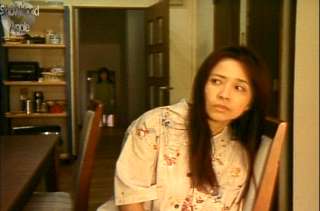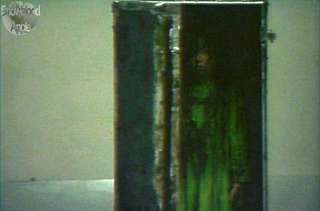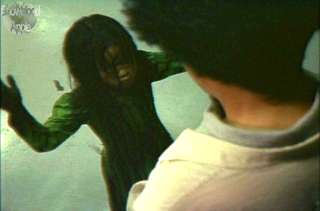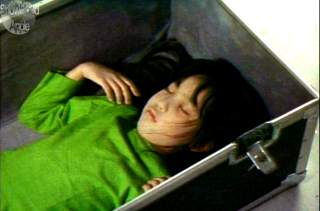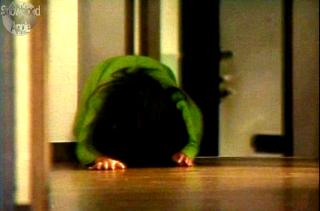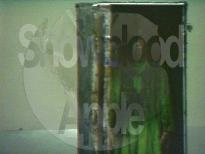Films by Kiyoshi Kurosawa: Cure Guard From The Underground Kairo Kourei Loft |

Review
©
Mandi Apple, 2003. |
|||||||||||||||||
Directed by Kiyoshi Kurosawa, 1999, 118 mins. starring Koji Yakusho, Jun Fubuki, Tsuyoshi Kusanagi, Ittoku Kishibe, Kitarou, Hikari Ishida, Ren Osugi, Sho Aikawa and Haruhiko Katô.
Kourei (aka Seance, aka Korei, aka Ko-Rei), directed by Kiyoshi Kurosawa, despite having clearly been commissioned as a made-for-TV movie and aired in Japan in 1999, is yet another triumph of masterful and artful film-making by one of the true masters and innovators of the New Wave horror genre. Following on in much the same tradition as the brooding, deep Cure, the terrifying and apocalyptic Kaïro, and the frankly baffling and claustrophobic weird philosophy of Charisma, Kourei represents a further insight into Kurosawa's strange, frightening, trancey universe, full of bizarre twists and turns of destiny, chillingly slow slides into insanity, and vengeful spirits, who, to quote the great man himself, "...are very Japanese - they don't really do anything", meaning (I guess) that it's bad enough that they just exist in the characters' lives - they don't actually have to do anything worse than haunt people to make a really scary movie. If you enjoyed any of the three films listed above, Kourei is an absolutely essential addition to your collection. Based on an early 1960's British novel and film, Seance on a Wet Afternoon (written by Mark McShane and starring Richard Attenborough!), but subtly rewritten to suit Kurosawa's purposes, the movie is not one to watch if you're just looking for a series of big jumps: Kurosawa's movies never work along those lines. Instead, the pace is drifting, as painfully slow as a snail on Mogadon at times, full of space and odd light quality, and the scenes slide from total normalcy into bizarre and creepy situations easily and seamlessly. Yes, you will be able to predict many of them well before they happen; but the tension is so taut throughout the entire movie that you won't care that you know what's coming, you'll sit back and just savour the moments of fear instead. As ever, the soundtrack is beautiful, ambient, atmospheric and organic (save for one outstandingly eerie moment near the end, when a bit of hideous bagpipe blast shrieks away and almost - but not quite - detracts from the horror - actually, in a weird way, it adds to it), with lots of deep rumblings, wordless choral drones, metallic scrapings and very little in the way of incidental muzak. And the acting quality is brilliant, with Koji Yakusho (as wonderful as ever) giving an excellent and understated performance as Koji Sato, a very ordinary sound engineer thrown into very extraordinary circumstances; Jun Fubuki, as his psychic wife Junco, is equally excellent, playing her role through from a sympathetic angle to a truly unsympathetic one, with a delightful mixture of severe depression and naked ambition. And naturally, the cinematography is pure Kurosawa: spacey, murky, atmospheric, with some beautiful and dark imagery that will haunt you for days after seeing it.
Synopsis Kourei is a fairly straightforward story of how a terrible crime directly affects the lives of a seemingly ordinary married couple, Koji Sato (Koji Yakusho) and his wife Junco (Jun Fubuki). It's a bit like a comedy of errors, minus the comedy and plus a sense of horrors spinning out of control. He is a successful and well-respected sound engineer who's made quite a name for himself in the industry, whereas she works at home as a psychic medium, giving seances. Because of her terrible gift, she can no longer work a normal job, despite having tried to take waitressing work and being totally traumatised by the horrors she saw in the restaurant she was working in. However, she is helping a young psychology student at the university who is working on his thesis about the paranormal in relation to psychology, determined to prove to his professors that these phenomena are real. However, in another part of the city, events are taking place which will shatter the couple's lives forever: a man has kidnapped a little girl named Yoko, and the police have no idea where the girl is being hidden. Whilst Sato is sent on an assignment to record the sound of wind rushing through the trees out in the countryside, in a terrible twist of fate, the little girl, who has managed to escape from her kidnapper and is running away (with him in hot pursuit) through the same part of the forest, spots Sato's empty recording-equipment crate and climbs into it to hide. Unwittingly, Sato locks up his case without looking inside it and puts it into the back of his 4X4, trapping Yoko inside the crate. The next day, in the hope that not only will Junco prove that his thesis is correct but also help the police in this situation, the psychology student calls Junco into the university to talk to the detective assigned to the case. It turns out that the kidnapper has been caught by the police, but while he was trying to escape arrest, got hit over the head by a large piece of scaffolding and is lying unconscious in the hospital, unable to be interviewed about his crime. The student and the detective both ask Junco to see if she can pick up any psychic clues about the whereabouts of the little girl by holding items which belonged to her, and she does pick up something very vague, but decides not to tell the police until she's got a clearer idea of exactly where the girl is.
And so poor Koji and Junco go on about their business as usual, not once suspecting that the little girl everyone is searching for is currently residing in a dark case in their garage, until a couple of days later, Junco is tidying her living-room, and picks up of the items given to her by the police for psychic investigation - a handkerchief - and has such a horribly overwhelming blast of psychic terror from the girl that she simply knows Yoko is nearby, which leads to her and Koji discovering the girl's unconscious body in the crate in the garage. However, despite both of them being terrified at the ramifications of this dreadful quirk of fate, whilst Koji wants to take her immediately to the hospital and alert the authorities, a really devious and unpleasantly ambitious scheme begins to form in Junco's mind. She begs Koji to give her just one day in which to implement this plan, which she is convinced will bring her fame and fortune so that she will finally be able to escape from her husband's shadow and grab a bit of the limelight for herself for a change. But she doesn't know that her plan is about to go horribly wrong and that she is in fact making a bad situation even worse, until neither of them have control over their future any longer...
Every bit as fascinating and hypnotic as Cure, with some truly poisonous creep-out moments that look like nothing much to the eye but lodge in your brain semi-permanently, Kourei really is a must-see movie for all Kurosawa fans and anyone who enjoys a really profound psychological chill. At times, the original British structure of the screenplay is quite apparent; even if you've not seen the original movie (as we haven't), you can sense the way in which it was probably played as a kind of interior drama, with the horribly strained and empty relationship between the husband and wife, particularly as (from what I understand) Mark McShane's 'psychic wife' wasn't actually at all psychic, completely unlike Kurosawa's character, who has to bear the cross of her unwanted gifts as well as being continually in the shadow of her husband and his well-respected sound engineering work. Kurosawa has drawn out the lines of development in this character so well that the motives behind her actions are extremely psychologically complex, in stark juxtaposition with the husband's seemingly simple goodness and straightforward nature. As with all of his films that I've seen to date, Kurosawa seems to continually portray a basically innate understanding of the psychology of his characters, making them appear really sympathetic, honest and believable as actual human beings in their weird and disjointed circumstances. And at times, the terrifying situations he places them in are so tense and edgy they're almost unwatchable from sheer empathy: the scene in which Sato tries to quiet the little girl he's hiding upstairs while the police detective is talking to his wife downstairs is enough to put anyone on the edge of their seat, chewing their knuckles with worry. Kurosawa forces us to face our deepest, oldest fears - whether they are looking a ghost in the face and knowing they're looking right back at us, or being implicated and arrested for a crime we took no part in.
Frankly, I can't imagine this film ever being commissioned for TV anywhere outside Japan: I simply can't think of what UK TV executives would make of such a terrifying work of art landing on their desks. I think a huge credit should be given to the powers that be in the world of Japanese TV for allowing such a great movie to be shown as a terrestrial program. Interestingly enough, whilst Kourei post-dates Nakata Hideo's legendary Ring, you can see some fairly evident Sadako-esque influences in the behaviour of the little girl Yoko (check the pictures above to see what I mean, particularly the shot of her crawling up from the stairs); but don't think for a second that Kurosawa just replicated a Sadako doppelganger here, or that the influences don't go both ways - Yoko's character clearly informed Nakata's scary child character Mitsuko in Dark Water! (But if you're au fait with Dark Water before watching Kourei, you'll no doubt pick that up yourself! ;-)) Either way, Kourei is a great, classic movie, and one you should seriously consider adding to your collection. More accessible than Charisma but not as absolutely pant-wettingly grown-adult-nightmare-inducing as Kaïro, Kourei is a great place to start if you're only just discovering the atmospheric, aesthetic, deep, weird psychological world of Kiyoshi Kurosawa's horror movies, low on gore and high on pure terror. Snowblood
Apple Rating for this film: Kourei
Wallpaper |
|||||||||||||||||
text,
webdesign (c) 2002, 2003 M. Apple. All characters, situations and
images remain the property of their respective owners. The
text and webdesign of this site may not be copied, reproduced, mirrored,
printed commercially or ripped off in any other way. Do not hotlink
directly to images hosted on this site. |
|||||||||||||||||


